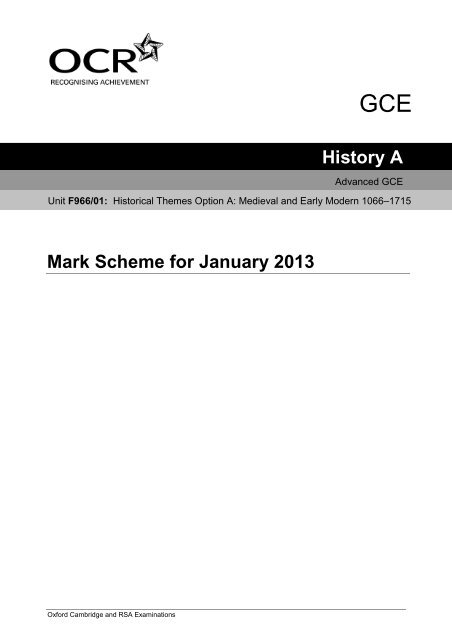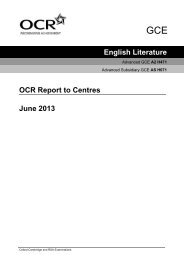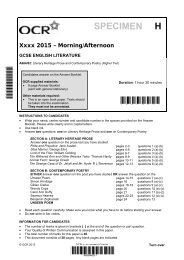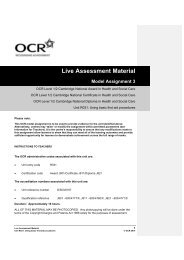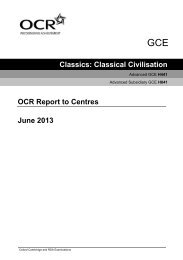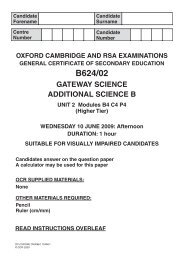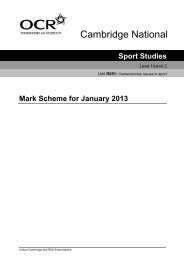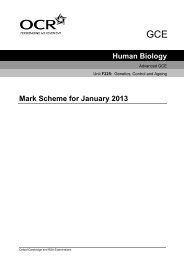Mark scheme - Unit F966/01 - Historical themes - Option A - OCR
Mark scheme - Unit F966/01 - Historical themes - Option A - OCR
Mark scheme - Unit F966/01 - Historical themes - Option A - OCR
Create successful ePaper yourself
Turn your PDF publications into a flip-book with our unique Google optimized e-Paper software.
GCE<br />
History A<br />
Advanced GCE<br />
<strong>Unit</strong> <strong>F966</strong>/<strong>01</strong>: <strong>Historical</strong> Themes <strong>Option</strong> A: Medieval and Early Modern 1066–1715<br />
<strong>Mark</strong> Scheme for January 2<strong>01</strong>3<br />
Oxford Cambridge and RSA Examinations
<strong>OCR</strong> (Oxford Cambridge and RSA) is a leading UK awarding body, providing a wide range of<br />
qualifications to meet the needs of candidates of all ages and abilities. <strong>OCR</strong> qualifications<br />
include AS/A Levels, Diplomas, GCSEs, Cambridge Nationals, Cambridge Technicals,<br />
Functional Skills, Key Skills, Entry Level qualifications, NVQs and vocational qualifications in<br />
areas such as IT, business, languages, teaching/training, administration and secretarial skills.<br />
It is also responsible for developing new specifications to meet national requirements and the<br />
needs of students and teachers. <strong>OCR</strong> is a not-for-profit organisation; any surplus made is<br />
invested back into the establishment to help towards the development of qualifications and<br />
support, which keep pace with the changing needs of today’s society.<br />
This mark <strong>scheme</strong> is published as an aid to teachers and students, to indicate the requirements<br />
of the examination. It shows the basis on which marks were awarded by examiners. It does not<br />
indicate the details of the discussions which took place at an examiners’ meeting before marking<br />
commenced.<br />
All examiners are instructed that alternative correct answers and unexpected approaches in<br />
candidates’ scripts must be given marks that fairly reflect the relevant knowledge and skills<br />
demonstrated.<br />
<strong>Mark</strong> <strong>scheme</strong>s should be read in conjunction with the published question papers and the report<br />
on the examination.<br />
<strong>OCR</strong> will not enter into any discussion or correspondence in connection with this mark <strong>scheme</strong>.<br />
© <strong>OCR</strong> 2<strong>01</strong>3<br />
8
<strong>F966</strong>/<strong>01</strong> <strong>Mark</strong> Scheme January 2<strong>01</strong>3<br />
Subject-specific <strong>Mark</strong>ing Instructions<br />
Distribution of marks for each level that reflects the <strong>Unit</strong>’s AOs<br />
2 answers: Each maximum mark 60<br />
A<strong>01</strong>a<br />
A<strong>01</strong>b<br />
IA 18–20 36–40<br />
IB 16–17 32–35<br />
II 14–15 28–31<br />
III 12–13 24–27<br />
IV 10–11 20–23<br />
V 8–9 16–19<br />
VI 4–7 8–15<br />
VII 0–3 0–7<br />
1
<strong>F966</strong>/<strong>01</strong> <strong>Mark</strong> Scheme January 2<strong>01</strong>3<br />
Notes:<br />
(i)<br />
(ii)<br />
(iii)<br />
(iv)<br />
Allocate marks to the most appropriate level for each AO.<br />
If several marks are available in a box, work from the top mark down until the best fit has been found.<br />
Many answers will not fall at the same level for each AO.<br />
Candidates will demonstrate synoptic skills by drawing together appropriate techniques, knowledge and understanding to evaluate<br />
developments over the whole of the period<br />
AOs AO1a AO1b<br />
Total mark<br />
for each<br />
question =<br />
60<br />
Recall, select and deploy historical knowledge<br />
appropriately, and communicate knowledge and<br />
understanding of history in a clear and effective manner.<br />
Level IA • Uses a wide range of accurate and relevant<br />
evidence<br />
• Accurate and confident use of appropriate historical<br />
terminology<br />
• Answer is clearly structured and coherent<br />
• communicates accurately and legibly.<br />
Level IB<br />
18–20<br />
Level IB<br />
• Uses accurate and relevant evidence<br />
• Accurate use of a range of appropriate historical<br />
terminology<br />
• Answer is clearly structured and mostly coherent;<br />
communicates accurately and legibly<br />
16–17<br />
Demonstrate understanding of the past through explanation, analysis<br />
and arriving at substantiated judgements of:<br />
- key concepts such as causation, consequence, continuity, change<br />
and significance within an historical context<br />
- the relationships between key features and characteristics of the<br />
periods studied.<br />
• Excellent understanding of key concepts (eg continuity and<br />
change) relevant to analysis in their historical context<br />
• Excellent synthesis and synoptic assessment<br />
• Answer is consistently and relevantly analytical with developed<br />
explanations and supported judgements<br />
• May make unexpected but substantiated connections over the<br />
whole period.<br />
36–40<br />
• Very good level of understanding of key concepts (eg continuity<br />
and change) in their historical context<br />
• Answer is consistently focused on the question set<br />
• Very good level of explanation/analysis, and provides supported<br />
judgements<br />
• Very good synthesis and synoptic assessment of the whole<br />
period.<br />
32–35<br />
2
<strong>F966</strong>/<strong>01</strong> <strong>Mark</strong> Scheme January 2<strong>01</strong>3<br />
AOs AO1a AO1b<br />
Level II • Uses mostly accurate and relevant evidence<br />
• Generally accurate use of historical terminology<br />
• Answer is structured and mostly coherent; writing is<br />
legible and communication is generally clear.<br />
14–15<br />
Level III • Uses relevant evidence but there may be some<br />
inaccuracy<br />
• Answer includes relevant historical terminology but<br />
this may not be extensive or always accurately<br />
used<br />
• Most of the answer is structured and coherent;<br />
writing is legible and communication is generally<br />
clear.<br />
12–13<br />
Level IV • There is deployment of relevant knowledge but<br />
level/accuracy will vary.<br />
• Some unclear and/or underdeveloped and/or<br />
disorganised sections<br />
• Mostly satisfactory level of communication.<br />
10–11<br />
• Good level of understanding of key concepts (eg continuity and<br />
change) in their historical context<br />
• Good explanation/analysis but overall judgements may be uneven<br />
• Answer is focused on the issues in the question set<br />
• Good synthesis and assessment of developments over most of<br />
the period.<br />
28–31<br />
• Shows a sound understanding of key concepts, especially<br />
continuity and change, in their historical context<br />
• Most of the answer is focused on the question set<br />
• Answers may be a mixture of analysis and explanation but also<br />
description and narrative, but there may also be some uneven<br />
overall judgements; OR answers may provide more consistent<br />
analysis but the quality will be uneven and its support often<br />
general or thin<br />
• Answer assesses relevant factors but provides only a limited<br />
synthesis of developments over most of the period.<br />
24–27<br />
• Satisfactory understanding of key concepts (eg continuity and<br />
change) in their historical context<br />
• Satisfactory focus on the question set<br />
• Answer may be largely descriptive/narratives of events, and links<br />
between this and analytical comments will typically be weak or<br />
unexplained<br />
• Makes limited synoptic judgements about developments over only<br />
part of the period.<br />
20–23<br />
3
<strong>F966</strong>/<strong>01</strong> <strong>Mark</strong> Scheme January 2<strong>01</strong>3<br />
AOs AO1a AO1b<br />
Level V • General and basic historical knowledge but also<br />
some irrelevant and inaccurate material<br />
• Often unclear and disorganised sections<br />
• Adequate level of communication but some weak<br />
prose passages.<br />
8–9<br />
Level VI • Use of relevant evidence will be limited; there will<br />
be much irrelevance and inaccuracy<br />
• Answers may have little organisation or structure<br />
• Weak use of English and poor organisation.<br />
4–7<br />
Level VII • Little relevant or accurate knowledge<br />
• Very fragmentary and disorganised response<br />
• Very poor use of English and some incoherence.<br />
0–3<br />
• General understanding of key concepts (eg continuity and<br />
change) in their historical context<br />
• Some understanding of the question but answers may focus on<br />
the topic and not address the question set OR provides an<br />
answer based on generalisation<br />
• Attempts an explanation but often general coupled with assertion,<br />
description/narrative<br />
• Very little synthesis or analysis and only part(s) of the period will<br />
be covered.<br />
16–19<br />
• Very little understanding of key concepts (eg continuity and<br />
change) in their historical context<br />
• Limited perhaps brief explanation<br />
• Mainly assertion, description/narrative<br />
• Some understanding of the topic but not the question’s<br />
requirements.<br />
8–15<br />
• Weak understanding of key concepts (eg continuity and change)<br />
in their historical context<br />
• No explanation<br />
• Assertion, description/narrative predominate<br />
• Weak understanding of the topic or of the question’s<br />
requirements.<br />
0–7<br />
4
<strong>F966</strong>/<strong>01</strong> <strong>Mark</strong> Scheme January 2<strong>01</strong>3<br />
Question Answer <strong>Mark</strong>s Guidance<br />
1 The continental possessions of the crown in Normandy and later in the Angevin Empire,<br />
including efforts made to hold onto or regain them, can be seen to have been a significant<br />
factor in the development of English central government. They necessitated a form of<br />
government which could function effectively in the absence of the king, which led ultimately<br />
to the development of the post of chief justiciar who exercised vicegerent authority by the<br />
later twelfth century and whose antecedents lay in the roles performed by Ranulf Flambard<br />
under William II and Roger of Salisbury under Henry I. The increasing costs of warfare<br />
needed to maintain those lands, and of the more complex administrative system which<br />
developed, also led kings to wish to maximise their finances and the profits of justice. This<br />
led to the development of the Exchequer in Henry I’s reign and more control over sheriffs,<br />
first through their rendering regular accounts and then through the great inquests of sheriffs<br />
in 1170, 1194 and 1213. It could also be argued to have played a part in the introduction of<br />
more control over justice with the introduction of eyres and itinerant justices and, in Henry<br />
II’s reign, the possessory assizes, Grand assize and standardised writs. All of this<br />
machinery made the government more systematic, bureaucratic and therefore able to<br />
function in the king’s absence, as well as more profitable. Some might also argue that the<br />
loss of Normandy created some of the tensions which lay behind the rebellion of 1215 which<br />
resulted in the dismantling of much of Angevin government, so producing further change.<br />
However, in order to reach a judgment on the main factor behind the changes candidates<br />
need to set the continental possessions against other reasons and compare. Kings and/or<br />
their officials played an important part in recognising the need for the development of<br />
government and in activating measures to bring about change. As leading officials were also<br />
often churchmen – Flambard, Roger of Salisbury, Hubert Walter – the role of the church<br />
could also be considered. Some might argue that the main reason for change was the<br />
Conquest which imported Norman ideas to build on Saxon foundations and led to feudal<br />
government. Arguably some of the main changes came in the reign of Henry II and were<br />
prompted at least in part by his desire to re-establish firm government after Stephen’s reign.<br />
60 Examiners must be open to<br />
alternative approaches. If in<br />
doubt, they should consult<br />
their Team Leader.<br />
5
<strong>F966</strong>/<strong>01</strong> <strong>Mark</strong> Scheme January 2<strong>01</strong>3<br />
Question Answer <strong>Mark</strong>s Guidance<br />
2 Candidates should not be penalised if they limit their answers to Lanfranc, Anselm, Becket<br />
and Langton, the archbishops mentioned in the specification. However, credit should be<br />
given to those who make appropriate reference to others such as Walter or Theobald of<br />
Bec.<br />
There is considerable similarity between the poor relations experienced by Anselm with<br />
William II and to some extent Henry I, Becket with Henry II and Langton with John. In each<br />
case relations were the result of clashes between archbishops keen to uphold the growing<br />
power of the church resulting from the papal reform movement and monarchs equally keen<br />
to maintain their traditional rights. Anselm quarrelled with William II over a range of things<br />
including recognition of the pope and with Henry I over investiture, Becket quarrelled with<br />
Henry II over ecclesiastical jurisdiction and Langton’s election was itself an expression of the<br />
church’s disregard for kings’ traditional rights. However, there were also differences. Anselm<br />
was able to reach a compromise with Henry I over investiture in 1107, despite having<br />
become fully aware of its implications during his exile. He had not managed to compromise<br />
with William II even over lesser matters.<br />
Henry II got on well with his archbishops before and after Becket. Most significantly, at the<br />
beginning of the period. Lanfranc enjoyed particularly good relations with William I. He<br />
helped William to use the authority of the church to establish Norman rule, agreed with<br />
William in refusing to accede to the pope’s requests and keeping the Investiture Contest at<br />
bay and got William’s support over the primacy. Similarly, towards the end of the period,<br />
Hubert Walter enjoyed good relations with Richard, running the country for him in his<br />
absence. Some candidates may wish to point to similarities in relations between those<br />
archbishops who were prepared to do the monarch’s work and those who were determined<br />
to uphold ecclesiastical claims in the face of monarchical rights.<br />
60 Examiners must be open to<br />
alternative approaches. If in<br />
doubt, they should consult<br />
their Team Leader.<br />
6
<strong>F966</strong>/<strong>01</strong> <strong>Mark</strong> Scheme January 2<strong>01</strong>3<br />
Question Answer <strong>Mark</strong>s Guidance<br />
3 Candidates may confine their answer to the archbishops mentioned in the specification,<br />
Lanfranc, Anselm, Becket and Langton and should not be penalised for this. However,<br />
appropriate reference to other archbishops should be rewarded.<br />
Some archbishops’ actions increased their control over the English Church. Although<br />
Lanfranc acted in conjunction with William and his authority depended on what the king<br />
would allow, nevertheless he established his authority over the church through his use of<br />
synods and created a sense of leadership through his monastic reforms, the beginning of<br />
separate ecclesiastical jurisdiction and his firm control over his bishops. The recognition of<br />
his personal primacy produced order and structure in the church. The association of the<br />
church with the establishment of Norman rule helped to enhance Lanfranc’s prestige and<br />
resisting the pope’s call to Rome also seemed to imply that power over the church in<br />
England rested with him. Anselm enhanced his power over the church by reaching a<br />
compromise with the king over investiture in which the king agreed to give up investiture<br />
with the ring and staff. Becket stood up to royal authority and defended the independence of<br />
the church over the trial of criminous clerks. Hubert Walter was able to hold councils to<br />
improve discipline in the church and restored its stability to some extent.<br />
By contrast, some actions of archbishops reduced their power over the church. Anselm’s<br />
and Becket’s periods of exile and Langton’s inability to enter the country undermined their<br />
power, as did Henry II’s use of York to crown Young Henry. Becket lost control over some of<br />
his bishops during his quarrel with Henry, especially Foliot. The primacy issue was never<br />
entirely settled. Moreover, power over the English church at times seemed to be more in the<br />
hands of the pope than the archbishop of Canterbury. For example, there was an increase<br />
in appeals to Rome under Stephen and popes intervened to reduce the metropolitan power<br />
of Canterbury, eg making Henry of Blois papal legate and, particularly, suspending Langton.<br />
60 Examiners must be open to<br />
alternative approaches. If in<br />
doubt, they should consult<br />
their Team Leader.<br />
7
<strong>F966</strong>/<strong>01</strong> <strong>Mark</strong> Scheme January 2<strong>01</strong>3<br />
Question Answer <strong>Mark</strong>s Guidance<br />
4 Some candidates may answer this question sequentially but a more effective and synoptic<br />
approach would be to look at the respective objectives thematically to identify similarities<br />
and differences or to organise their essays according to differences and similarities. Irish<br />
rebellions were generally motivated by political and religious objectives but each rebellion<br />
was also riddled with factional nobles who had personal ambitions and political objectives in<br />
Ireland. Irish nobles increasingly opposed English rule in Dublin and the O’Neill (1558–67),<br />
Munster (1569–73), Geraldine (1579–83) and Tyrone (1595–03) rebellions had political and<br />
self-serving undercurrents. Similarly in England, rebellions such as Lincoln, Warbeck,<br />
Northumberland, Wyatt, the Northern Earls and Essex, were led by or were strongly<br />
supported by factions, often intent on advancing themselves politically or even altering the<br />
English succession. This latter objective however was never the intention in Ireland. In<br />
Ireland there was growing discontent with English rule and most rebellions sought to alter or<br />
remove the Dublin administration. Similarly in England several rebellions aimed to remove<br />
royal councillors eg Morton and Bray (1497), Wolsey (1525), Cromwell, Rich and Audley<br />
(1536), Somerset (1549), Northumberland (1553) and the Cecils (1569 and 16<strong>01</strong>). Social<br />
and economic objectives were never the main cause of Irish rebellions though opposition to<br />
plantations and policies such as surrender and re-grant was evident in the O’Neill, Munster<br />
and Tyrone rebellions. In contrast in England, economic grievances such as unfair taxation,<br />
rack-renting and illegal enclosures, were more frequent and significant causes of rebellion.<br />
This is a key difference which better candidates should identify and explain. Several<br />
rebellions after 1534 had religious grievances as their main cause and the restoration of the<br />
‘true faith’ as a key objective: in Ireland in the Munster, Geraldine and Tyrone rebellions and<br />
in England in the Pilgrimage of Grace, Western, and Northern Earls’ rebellions. Better<br />
responses, however, could point out and explain why religious objectives ceased to be<br />
evident in England after 1569 whereas in Ireland they remained a key objective throughout<br />
Elizabeth’s reign. A range of comparative assessments across the period that is focused on<br />
objectives covering both England and Ireland is expected of the best answers.<br />
60 Candidates are expected to<br />
demonstrate understanding<br />
of the issues in each of their<br />
selected questions over a<br />
period of at least a hundred<br />
years (unless an individual<br />
question specifies a slightly<br />
shorter period.)<br />
Candidates are reminded of<br />
the synoptic nature of the<br />
<strong>Unit</strong>. Answers are required<br />
to demonstrate<br />
understanding of the<br />
processes of historical<br />
continuity, development and<br />
change across the full<br />
breadth of the period<br />
studied.<br />
Assessors must be open to<br />
alternative approaches. If in<br />
doubt, they should consult<br />
their Team Leader.<br />
8
<strong>F966</strong>/<strong>01</strong> <strong>Mark</strong> Scheme January 2<strong>01</strong>3<br />
Question Answer <strong>Mark</strong>s Guidance<br />
5 This question is concerned with the speed taken by Tudor governments in tackling<br />
rebellions and candidates should be rewarded for evaluating particular measures and<br />
specific rebellions in both England and Ireland. If discussion of Ireland is ignored or<br />
marginalised, then the answer is likely to be unbalanced. Credit should be given to<br />
candidates who assess ‘generally slow’ thematically rather than chronologically, and who<br />
focus on actual disturbances. Better essays should compare the effectiveness of<br />
government responses to rebellion. Henry VII and Elizabeth acted quickly to counter<br />
rebellions in England, Henry directing operations against the Simnel, Yorkshire and Cornish<br />
revolts and being pro-active in defeating Lovel, Stafford and Warbeck. Elizabeth entrusted<br />
her councils in London, York and Dublin to deal with disturbances, and generally acted<br />
quickly and decisively in handling her rebellions in England. The Northern Earls, Oxfordshire<br />
and Essex rebellions are likely to be cited. Henry VIII was slow to react to both the Amicable<br />
Grant and Pilgrimage of Grace uprisings, and neither Wolsey nor Cromwell was in full<br />
control of the crises. Somerset also failed to take appropriate measures to suppress the<br />
Western and Kett’s rebellions quickly and Mary was badly advised by her council about<br />
Wyatt’s revolt. Better essays are likely to assess the reasons for the varied government<br />
reactions: the size of rebellion, distance from London and Dublin, support in the localities<br />
and information and resources at the crown’s disposal are relevant factors that may be<br />
usefully considered. In most cases advisers were consulted, and information gathered and<br />
assessed, before instructions were sent to officials and nobles in affected areas, all of which<br />
took time. Most Tudor administrations bought time, issued propaganda against the rebels<br />
and tried to avoid a military conflict until the government forces were large enough to be<br />
certain of victory. Henry VII more than any other ruler resorted to an army to defeat his<br />
rebels but his successors tried other strategies first. Mary and Elizabeth were generally<br />
more effective than Henry VIII and Edward in their deployment of troops but the latter rulers<br />
faced longer and larger rebellions. It may be pointed out that Irish rebellions presented a<br />
different challenge to Tudor governments and few were able to suppress them quickly. The<br />
innate hostility felt by the Irish towards the English as rulers and landowners, clan rivalry,<br />
unreliable nobles and limited resources made the quick suppression of rebellions hard to<br />
achieve. Only Henry VII can be regarded as having been successful and even in his case,<br />
any claim to victory should be qualified. Elizabeth on the other hand dealt with each of her<br />
four Irish rebellions slowly and ineffectively. Expect the best essays to look at a range of<br />
rebellions in England and Ireland in support of their argument.<br />
60 Candidates are expected to<br />
demonstrate understanding<br />
of the issues in each of their<br />
selected questions over a<br />
period of at least a hundred<br />
years (unless an individual<br />
question specifies a slightly<br />
shorter period.)<br />
Candidates are reminded of<br />
the synoptic nature of the<br />
<strong>Unit</strong>. Answers are required<br />
to demonstrate<br />
understanding of the<br />
processes of historical<br />
continuity, development and<br />
change across the full<br />
breadth of the period<br />
studied.<br />
Assessors must be open to<br />
alternative approaches. If in<br />
doubt, they should consult<br />
their Team Leader.<br />
9
<strong>F966</strong>/<strong>01</strong> <strong>Mark</strong> Scheme January 2<strong>01</strong>3<br />
Question Answer <strong>Mark</strong>s Guidance<br />
6 Most candidates are likely to argue that the Crown was the most important element in the<br />
maintenance of stability. A source of unity and authority, divinely appointed and guardian of<br />
the common law, the monarch was the embodiment of order. It was not enough, however, to<br />
assume that all subjects would obey their ruler and the Tudors understood the need to apply<br />
propaganda, patronage and appropriate policies. Propaganda was used to strengthen their<br />
image and enhance the mystique of monarchy. The dispensation of patronage through<br />
grants, honours and appointments also built up a key link between central and local<br />
government. Policies that alleviated social and economic distress also reduced the<br />
likelihood of disorder and the absence of rebellions in England for much of Elizabeth’s reign<br />
in part reflects the growth in legislation. The character of rulers was also important. Strong,<br />
adult monarchs such as Henry VIII and Elizabeth were more readily obeyed, whereas the<br />
boy-king, Edward, experienced many rebellions. Some candidates may focus on the role of<br />
central government in developing respect for the monarchy, the growth of parliament as a<br />
vehicle for voicing discontent, the use of regional councils, crown courts and popular royal<br />
policies taken to reduce the potential for political instability. Thus Henry VII used parliament<br />
to deal with retaining and strengthen the crown’s authority; Henry VIII extended the treason<br />
and heresy laws and Elizabeth introduced recusancy and penal laws but applied them<br />
sparingly. In addition to the Crown, candidates should examine other factors by which the<br />
Tudors kept control. Consideration may be given to the work of JPs, lords lieutenant and<br />
sheriffs, most of whom were gentry and nobles, who dealt with local grievances through<br />
hard work, diplomacy and common sense. Mayors, aldermen and town officials also<br />
assisted local clergy and nobles in resolving economic and social problems, usually before<br />
they got out of hand. The importance of the clergy and nobility may also be considered.<br />
Many nobles served as royal councillors both in London and in a regional capacity, as<br />
sheriffs, JPs, lord lieutenants, and special commissioners in the counties, and candidates<br />
could suggest how these officers upheld political stability. As leading landowners, nobles<br />
were also expected to arm their tenants and servants to suppress disturbances and, when<br />
necessary, fight in royal armies. The upper clergy also played a key part in the<br />
administration of the country. They headed royal commissions, acted as councillors,<br />
presided over diocesan courts, enforced proclamations and delivered sermons in support of<br />
the establishment. The parish clergy were generally loyal to the crown though candidates<br />
may point to clerical support for rebels in 1536 and 1549 concerning religious grievances.<br />
The best answers should compare the importance of the Crown with other factors in<br />
maintaining political stability in England.<br />
60 Candidates are expected to<br />
demonstrate understanding<br />
of the issues in each of their<br />
selected questions over a<br />
period of at least a hundred<br />
years (unless an individual<br />
question specifies a slightly<br />
shorter period.)<br />
Candidates are reminded of<br />
the synoptic nature of the<br />
<strong>Unit</strong>. Answers are required<br />
to demonstrate<br />
understanding of the<br />
processes of historical<br />
continuity, development and<br />
change across the full<br />
breadth of the period<br />
studied.<br />
Assessors must be open to<br />
alternative approaches. If in<br />
doubt, they should consult<br />
their Team Leader.<br />
10
<strong>F966</strong>/<strong>01</strong> <strong>Mark</strong> Scheme January 2<strong>01</strong>3<br />
Question Answer <strong>Mark</strong>s Guidance<br />
7 Candidates should set the importance of royal finances against other factors to reach a<br />
judgement. Weak answers are likely to have few details of royal finances or fail to recognise<br />
how they may have affected the aims and conduct of foreign policy. Better responses could<br />
usefully discuss the implications of both limited and extensive financial resources on the<br />
objectives and implementation of foreign policy, and assess the cost of maintaining armies<br />
and navies in peace-time as well as war. They might argue that limited finances resulted in a<br />
defensive and prudent foreign policy, a characteristic of Henry VII’s reign. A full treasury<br />
made more options available and, for instance, enabled Henry VIII to wage war in 1512–14<br />
and 1542–46, and enabled Elizabeth to be more aggressive towards Spain in the 1580s.<br />
Royal finances restricted all administrations, for instance Henry VIII’s desire for war in the<br />
1520s and for much of Edward’s and Mary’s reigns, and resulted in more neutral and<br />
cautious foreign policies and the increasing importance of continental allies. Other factors,<br />
however, need to be considered for higher marks. The best essays should assess the<br />
relationship between financial and other factors before determining which factor was the<br />
most important. Trade and commercial factors, for instance, could be usefully considered.<br />
Henry VII, Mary and Elizabeth recognised the advantages of expanding overseas trade.<br />
Some candidates may argue that trade was always of secondary importance when<br />
compared with financial and political factors but it became increasingly important under<br />
Elizabeth. This was due to the collapse of the Antwerp market for English woollen cloth, the<br />
search for new overseas markets, the conflict with Spain over American trade and the<br />
impact of the Dutch Revolt on English merchants. Political, dynastic, personal and religious<br />
factors are other possible areas for consideration. Some may argue that political interests,<br />
such as national security or the welfare of the Tudor monarchy, were consistently influential;<br />
some may suggest dynastic factors were of major importance under Henry VII, Henry VIII<br />
and Mary. Others may see personal or religious factors as being of major importance<br />
particularly in Mary’s and Elizabeth’s reigns. Personal ambition may be seen as the aim of<br />
some rulers: Henry VII wanted to secure his dynasty, Henry VIII sought to emulate Henry V<br />
in war against France, and Somerset was eager to defeat the Scots and secure the northern<br />
border. In contrast, the foreign policies of Mary and Elizabeth could be argued to have been<br />
less affected by ambition. Some candidates may conclude that financial considerations were<br />
of primary importance in influencing Tudor foreign policy but others will disagree.<br />
60 Candidates are expected to<br />
demonstrate understanding<br />
of the issues in each of their<br />
selected questions over a<br />
period of at least a hundred<br />
years (unless an individual<br />
question specifies a slightly<br />
shorter period.)<br />
Candidates are reminded of<br />
the synoptic nature of the<br />
<strong>Unit</strong>. Answers are required<br />
to demonstrate<br />
understanding of the<br />
processes of historical<br />
continuity, development and<br />
change across the full<br />
breadth of the period<br />
studied.<br />
Assessors must be open to<br />
alternative approaches. If in<br />
doubt, they should consult<br />
their Team Leader.<br />
11
<strong>F966</strong>/<strong>01</strong> <strong>Mark</strong> Scheme January 2<strong>01</strong>3<br />
Question Answer <strong>Mark</strong>s Guidance<br />
8 For much of the Middle Ages, England and France had been traditional rivals, competing for<br />
the throne of France, lands in France, continental trade and commerce, and influence in<br />
Scotland. Each of the Tudors went to war with France but for different reasons. Henry VII<br />
tried to avoid war but felt the need to restrain Charles VIII from overrunning Brittany and<br />
threatening England, and so declared war in 1489. Henry VIII went to war on three<br />
occasions. He wanted to extend English lands in France and perhaps acquire the crown<br />
itself but was rebuffed by the equally ambitious Francis I, who used the Scots to the<br />
advantage of France. The Protestant inclined Edward VI had to contend with the warminded<br />
Henry II, who was determined to recover Boulogne, and Mary, loyal to her Spanish<br />
husband, was forced to surrender Calais to France in 1558 after a brief war. Elizabeth was<br />
keen to recover Calais and sided with French Protestant nobles at war with the French<br />
government in 1562 before she declared peace in 1564. Candidates could usefully assess<br />
the main reasons for these fairly consistent developments: France’s growing military, naval<br />
and financial power, its desire to reclaim land held by England, the Tudors alliance with<br />
Spain from 1489, the dynastic and territorial ambitions of Henry VIII, and England’s move<br />
towards a Protestant faith. A turning point, however, was reached in the period from 1558 to<br />
1564, and an assessment of key changes at this time may figure in better essays.<br />
Candidates are likely to assess the personality of Elizabeth, who was eager to avoid<br />
financing a war and sought a rapprochement with France after 1564. She was aided in this<br />
by the expulsion of French troops from Scotland in 1560 and the conversion of England’s<br />
northern neighbour into a Protestant state. Developments in Scotland were crucial in<br />
changing the dynamics of England’s relationship with France. Thereafter, Elizabeth did her<br />
best to befriend the French while preventing the renewal of the Auld Alliance. By 1558<br />
neither France nor England was financially strong enough to consider war a viable policy<br />
and each came to regard the growing power of Spain under Philip II to be a greater threat to<br />
their security. France’s recovery of Calais in 1558, depleted royal finances and the outbreak<br />
of the French Wars of Religion in 1562 greatly reduced the threat of a French invasion of<br />
England and made a durable Anglo-French alliance (signed at Blois in 1572) more feasible.<br />
Elizabeth preferred peaceful diplomacy to aggression and her counterpart, Catherine de<br />
Medici, focused on domestic rather than foreign affairs. In assessing the reasons for the<br />
changes, we can expect candidates to prioritise key developments and contrast elements<br />
present at the beginning of the period with the situation at the end. Some will view the rise of<br />
Spain as seminal; others may regard events in Scotland and France as crucial; and some<br />
will see the personalities and policies of Elizabeth, Philip and the Valois kings (together with<br />
Catherine) as all-important.<br />
60 Candidates are expected to<br />
demonstrate understanding<br />
of the issues in each of their<br />
selected questions over a<br />
period of at least a hundred<br />
years (unless an individual<br />
question specifies a slightly<br />
shorter period.)<br />
Candidates are reminded of<br />
the synoptic nature of the<br />
<strong>Unit</strong>. Answers are required<br />
to demonstrate<br />
understanding of the<br />
processes of historical<br />
continuity, development and<br />
change across the full<br />
breadth of the period<br />
studied.<br />
Assessors must be open to<br />
alternative approaches. If in<br />
doubt, they should consult<br />
their Team Leader.<br />
12
<strong>F966</strong>/<strong>01</strong> <strong>Mark</strong> Scheme January 2<strong>01</strong>3<br />
Question Answer <strong>Mark</strong>s Guidance<br />
9 England was affected in a variety of ways as a result of its foreign relations. Candidates<br />
might distinguish between dynastic and political affairs but some will treat the two elements<br />
as part of the same issue and inter-changeable, which is fine. They may argue that, to an<br />
extent, the Tudors could have done more to protect their dynasty from outside interference<br />
but at least three of the Tudors made dynastic alliances to safeguard the country’s security.<br />
Henry VII, Henry VIII and Mary had close relations with the Spanish Habsburgs, as did<br />
Elizabeth until the 1570s, based on the 1489 Treaty of Medina del Campo. Despite the<br />
Anglo-Scottish Treaty of Ayton of 1503, which saw the marriage of Margaret Tudor to James<br />
IV, further attempts to establish dynastic links, notably between Edward VI and Mary Queen<br />
of Scots, failed. Similarly Anglo-French ties, established in 1514 by the marriage of Mary<br />
and Louis XII, were not extended, despite attempts in the 1530s and 1540s to secure<br />
dynastic settlements and Elizabeth’s toying with Anjou and Alençon in the 1570s.<br />
Candidates may also assess how and why foreign powers attempted to influence the<br />
English succession. Burgundy and France aided pretenders to Henry VII’s throne, Charles V<br />
pressurised Henry VIII not to divorce Katherine of Aragon, and France and Spain supported<br />
Mary Queen of Scots’ claim to Elizabeth’s throne by encouraging plots and rebellions, and<br />
by sending troops to Ireland. Foreign relations also had an important impact on English<br />
political affairs: some ministers fell from office, and the privy council and parliament became<br />
more involved politically without ever having control of policy making. Thus Wolsey,<br />
Cromwell and Somerset fell from power as a result of pursuing misguided foreign policies.<br />
Relations between the privy council and monarch were often tested by overseas events and<br />
though the council was usually supportive of royal policies, divisions arose between<br />
councillors eg Somerset and Warwick in Edward’s reign, Paget and Gardiner in advising<br />
Mary, and Leicester and Burghley in Elizabeth’s reign. Candidates may well explore the<br />
rivalry among Elizabethan councillors concerning policies towards the Dutch Revolt, the<br />
French Wars, war with Spain, Elizabeth’s marriage and the fate of Mary Queen of Scots.<br />
Parliamentary relations were also affected by foreign developments. MPs and peers rarely<br />
challenged the royal prerogative to determine policies but they increasingly questioned<br />
some of the decisions eg Mary’s wish to marry Philip, Elizabeth’s reluctance to name a<br />
successor, get married or raise money for war with Spain. The crown’s reliance on<br />
parliament to subsidise its foreign policy led to regular sessions after 1571 and was an<br />
important political development in the history of parliament. The best essays should assess<br />
a range of developments that affected English dynastic and political affairs before reaching<br />
a judgement on their relative importance.<br />
60 Candidates are expected to<br />
demonstrate understanding<br />
of the issues in each of their<br />
selected questions over a<br />
period of at least a hundred<br />
years (unless an individual<br />
question specifies a slightly<br />
shorter period.)<br />
Candidates are reminded of<br />
the synoptic nature of the<br />
<strong>Unit</strong>. Answers are required<br />
to demonstrate<br />
understanding of the<br />
processes of historical<br />
continuity, development and<br />
change across the full<br />
breadth of the period<br />
studied.<br />
Assessors must be open to<br />
alternative approaches. If in<br />
doubt, they should consult<br />
their Team Leader.<br />
13
<strong>F966</strong>/<strong>01</strong> <strong>Mark</strong> Scheme January 2<strong>01</strong>3<br />
Question Answer <strong>Mark</strong>s Guidance<br />
10 Candidates are likely to suggest that there are arguments that the Catholic Church owed a<br />
great deal to the growth of Protestantism and that developments after 1517 were essentially<br />
a response to it; but also that the Catholic revival began before the advent of Protestantism<br />
and that some features developed independently of it. Some candidates may assess the<br />
nature of the Catholic Church and reforms that were taking place before Luther’s outburst,<br />
and so refer to the Fifth Lateran Council of 1512–17, monastic observant reforms, the<br />
creation of new orders and lay groups, the establishment of the Spanish Inquisition, and<br />
biblical humanists and early Catholic reformers such as Erasmus, Savonarola, Cisneros,<br />
and Lefèvre. They are likely to set any changes from 1492 against the failure of the Papacy<br />
to lead by example, the ineffectual reforms resulting from the Lateran Council, the limited<br />
impact that reformed orders had outside Italy and the tendency for the Church to be<br />
conservative and introspective. It can however be argued that the Protestant Reformation<br />
after 1517 changed the speed, character and outcome of the Catholic Reformation.<br />
Candidates do not have to be familiar with the theological beliefs of Protestant reformers but<br />
they should be aware of the impact of reformers such as Luther, Zwingli and Calvin. They<br />
could discuss how Protestants brought about a reform of clerical abuses and perhaps<br />
unwittingly produced a clearer and unequivocal definition of doctrine at Trent. They might<br />
discuss the importance that the Catholic Church later attached to preaching and sermons,<br />
both of which were key traits of Lutheranism, or the role of the confessional and consistory<br />
to achieve greater obedience and uniformity in the Catholic Church, which reflected the<br />
influence of Calvinism. Some might examine the importance of education and the growing<br />
attention given to meeting the social and spiritual needs of the Catholic laity, which in part<br />
reflected the influence of Luther and Calvin. Some candidates may suggest that not all<br />
features of the Catholic Reformation after 1517 should be attributed to Protestant reformers.<br />
For example, new orders such as the Oratories, Ursulines, Barnabites, Theatines, Jesuits<br />
and Discalced Carmelites owed little to the Protestant Reformation; and the work of the<br />
Inquisition in Spain was more concerned with conversos, moriscos and levels of morality<br />
among the Catholic laity than with the persecution of Protestant heretics. A balance between<br />
Protestant and Catholic Reformation elements is expected of better essays, with specific<br />
focus given to ‘transformed’. Of course, some essays may claim that the premise is<br />
hypothetical but there is enough evidence to argue that, though the Catholic reform<br />
movement began before 1517, it was subsequently affected by Protestant reformers in<br />
many ways.<br />
60 Candidates are expected to<br />
demonstrate understanding<br />
of the issues in each of their<br />
selected questions over a<br />
period of at least a hundred<br />
years (unless an individual<br />
question specifies a slightly<br />
shorter period.)<br />
Candidates are reminded of<br />
the synoptic nature of the<br />
<strong>Unit</strong>. Answers are required<br />
to demonstrate<br />
understanding of the<br />
processes of historical<br />
continuity, development and<br />
change across the full<br />
breadth of the period<br />
studied.<br />
Assessors must be open to<br />
alternative approaches. If in<br />
doubt, they should consult<br />
their Team Leader.<br />
14
<strong>F966</strong>/<strong>01</strong> <strong>Mark</strong> Scheme January 2<strong>01</strong>3<br />
Question Answer <strong>Mark</strong>s Guidance<br />
11 Candidates can be expected to evaluate the role played by the Papacy in the Catholic<br />
Reformation and compare its contribution with other factors and influences. Most candidates<br />
are likely to claim that the Papacy was essential as leader of the Church and unifier of<br />
various Catholic movements, and contrast the work of popes before and after Paul III. How<br />
a reformed Papacy aided the Catholic Reformation should figure among better responses –<br />
Paul III commissioned a survey of the Church to discover the extent of clerical abuses, he<br />
opened the first session of the Council of Trent, founded the Roman Inquisition and Index,<br />
and authorised the foundation of the Jesuits. Paul IV revised the Index and supported the<br />
Inquisition but opposed Trent, the Jesuits and Spain. Pius IV issued the all-important<br />
Tridentine Decrees. Pius V reformed the Curia and catechism, breviary and missal. Gregory<br />
XIII refurbished Rome and encouraged missionaries to travel to Protestant countries. Sixtus<br />
V reformed the Curia, established 15 ‘congregations’, rebuilt St Peters and enforced<br />
episcopal residence. Clement VIII revised the Vulgate, issued a new Index and ordered a<br />
general visitation in Rome. These contributions may be compared to the negative<br />
contributions of earlier popes such as Alexander VI (corrupt and secular minded), Julius II<br />
(warrior pope and patron of the arts but convenor of the Lateran council), Leo X (simoniac<br />
and nepotist who banned Luther but to little effect) and Clement VII (failed to stop the<br />
spread of Lutheranism and Zwinglianism, the invasion of papal lands and the sack of<br />
Rome). A counter view is that other institutions and events were more vital to the Catholic<br />
Reformation. Candidates may usefully assess the new orders such as the Oratories,<br />
Ursulines, Barnabites, and Theatines; the reformed monastic orders such as the<br />
Observants; the revival of the inquisition in Spain in the 1480s; the work of clerics in Spain,<br />
France, Florence and England; Erasmus and Luther who identified areas of reform in the<br />
Church; and the appeal of Luther and Calvin that forced the Papacy and other Catholic<br />
leaders to implement reforms. Candidates may argue that institutions such as the Council of<br />
Trent, Jesuits and Roman Inquisition contributed more to the Catholic Reformation than did<br />
popes and the Papacy. This is a wide-ranging question and candidates will need to select<br />
their comparative synthesis from a range of alternative factors before reaching a judgement.<br />
They cannot, however, be expected to produce a comprehensive assessment of all factors<br />
but should produce a solid evaluation of popes and the Papacy.<br />
60 Candidates are expected to<br />
demonstrate understanding<br />
of the issues in each of their<br />
selected questions over a<br />
period of at least a hundred<br />
years (unless an individual<br />
question specifies a slightly<br />
shorter period.)<br />
Candidates are reminded of<br />
the synoptic nature of the<br />
<strong>Unit</strong>. Answers are required<br />
to demonstrate<br />
understanding of the<br />
processes of historical<br />
continuity, development and<br />
change across the full<br />
breadth of the period<br />
studied.<br />
Assessors must be open to<br />
alternative approaches. If in<br />
doubt, they should consult<br />
their Team Leader.<br />
15
<strong>F966</strong>/<strong>01</strong> <strong>Mark</strong> Scheme January 2<strong>01</strong>3<br />
Question Answer <strong>Mark</strong>s Guidance<br />
12 Candidates may agree or disagree with the premise. Arguments in favour of the statement<br />
may discuss some of the following: Protestantism was well established and appealing,<br />
especially Lutheranism in northern Germany and Scandinavia, Zwinglianism in several<br />
Swiss cantons, and Calvinism in Scotland, northern Netherlands and parts of France. The<br />
Emperor had limited influence in Germany and the Pope outside the Papal States; other<br />
secular rulers exerted a greater influence over the Church in their states eg England,<br />
Scotland, France, Switzerland, the Spanish Netherlands, northern and western Germany,<br />
and Scandinavia. The political condition of a state could limit its readiness to reform (eg civil<br />
war in France, political revolt in the Netherlands, the attitude of nobility and princes in<br />
Germany, the opposition of secular rulers such as Elizabeth I and James I). The prevailing<br />
social conditions hindered progress eg rural communities in Spain, France and Germany<br />
were conservative in their attitudes towards reform and reluctant to abandon traditional<br />
practices. Anticlericalism was inherent in more urbanised states that resented papal taxation<br />
and the influence of the Church in municipal affairs; such states were more receptive to<br />
Protestant ideas and propaganda spread by the printing press. There was resistance to the<br />
Jesuits and other missionaries in northern and western Europe. The inquisition and index<br />
also had a limited impact outside Spain and Italy; the ‘black legend’ reflected the antipathy<br />
felt towards Spain in particular, and even found expression in Catholic states governed by<br />
Philip II and Philip III. The Church was slow to clarify its aims: not until the Papacy had been<br />
revitalised, the Jesuits formed and the Tridentine Decrees published did a counter-attack<br />
begin.<br />
A counter-argument, however, is required that focuses on areas of, and reasons for, some<br />
successes in Europe. Some of the following points may be made: the Catholic Church<br />
stopped the spread of Protestantism in the southern Netherlands, areas of France, southern<br />
Germany and east European states due to the work of the Jesuits and Catholic<br />
missionaries, the leadership of German emperors and Catholic princes, the determination of<br />
Philip II of Spain, and the resistance of the Catholic League in France. The Council of Trent<br />
also strengthened the Church and Papacy, and Italian cardinals implemented reforms in<br />
Italy in the post-Tridentine period.<br />
60 Candidates are expected to<br />
demonstrate understanding<br />
of the issues in each of their<br />
selected questions over a<br />
period of at least a hundred<br />
years (unless an individual<br />
question specifies a slightly<br />
shorter period.)<br />
Candidates are reminded of<br />
the synoptic nature of the<br />
<strong>Unit</strong>. Answers are required<br />
to demonstrate<br />
understanding of the<br />
processes of historical<br />
continuity, development and<br />
change across the full<br />
breadth of the period<br />
studied.<br />
Assessors must be open to<br />
alternative approaches. If in<br />
doubt, they should consult<br />
their Team Leader.<br />
16
<strong>F966</strong>/<strong>01</strong> <strong>Mark</strong> Scheme January 2<strong>01</strong>3<br />
Question Answer <strong>Mark</strong>s Guidance<br />
13 A comparative assessment of French rulers is expected. Some candidates might approach<br />
the question thematically and, with reference to individual monarchs or periods, define ‘nation<br />
state’ before discussing the development of a more efficient and centralised administration,<br />
financial and religious reforms, papal relations, legal codes, suppression of over-mighty<br />
nobles, and the expansion of lands. Some candidates may focus their answer on periods of<br />
reform in 1515–17, 1522–24 and 1542–44 in the reign of Francis I. Candidates may consider<br />
issues such as the Concordat, the persecution of Protestants and humanists, the defeat of<br />
rebellion by Bourbon, the gaining of the Duchy of Brittany, the result of conflict with Charles,<br />
the Ordinance of Villers-Cotterets. Through legal and administrative reforms, he strengthened<br />
the internal condition of France, the political power of the monarchy, and the authority of the<br />
state in relation to the Church but weakened its finances and standing as an international<br />
power. The reign of Henry II also saw several key developments. In 1559 the long-running<br />
Italian wars ended and France made peace with Spain, which held until 1595. Cateau-<br />
Cambresis acknowledged Spain’s supremacy in Europe and finally ceded French claims to<br />
lands in Italy. Royal finances were pronounced bankrupt in 1557, which made the crown<br />
vulnerable to the nobility and estates for the foreseeable future. Rivalry between the<br />
Montmorency, Bourbon and Guise families also surfaced, which coloured French politics for<br />
the next 40 years. After 1559 many nobles lost their raison d’ être and turned instead to<br />
domestic violence. The reign also witnessed a steady growth in Calvinism and Henry II’s<br />
response was to persecute Huguenots through the Chambre Ardente but with only limited<br />
success. His unexpected death in 1559 left four young sons and an Italian queen mother in<br />
charge of France, which proved a recipe for disaster. Candidates should be aware that the<br />
power of the monarchy had been steadily growing since 1498 and with it many centralising<br />
features. Henry, however, lacked interest in administration and much resentment developed<br />
as a result of his heavy-handed dealing with the Paris Parlement, nobles and provincial<br />
estates. Candidates should focus on the main developments of Francis’s reign, and set them<br />
alongside alternative reigns or periods. They could compare the reign of Francis I with that of<br />
Louis XII, who codified the laws, kept taxes and expenditure low, improved the administration<br />
of justice, created new parlements and was a popular ruler in spite of an unsuccessful foreign<br />
policy. It is unlikely that candidates will view the reigns of Francis II, Charles IX and Henry III<br />
as periods of positive contributions to the development of the state but they could be regarded<br />
negatively. The reign of Henry IV, especially after 1598, could be usefully assessed. He began<br />
the rehabilitation of the country domestically (resolving religious and social divisions, laying<br />
sound economic foundations and restoring the crown’s political authority) and internationally<br />
(in respect of Spain, Savoy, the Valtelline, <strong>Unit</strong>ed Provinces and Cleves-Julich).<br />
60 Candidates are expected to<br />
demonstrate understanding<br />
of the issues in each of their<br />
selected questions over a<br />
period of at least a hundred<br />
years (unless an individual<br />
question specifies a slightly<br />
shorter period.)<br />
Candidates are reminded of<br />
the synoptic nature of the<br />
<strong>Unit</strong>. Answers are required<br />
to demonstrate<br />
understanding of the<br />
processes of historical<br />
continuity, development and<br />
change across the full<br />
breadth of the period<br />
studied.<br />
Assessors must be open to<br />
alternative approaches. If in<br />
doubt, they should consult<br />
their Team Leader.<br />
17
<strong>F966</strong>/<strong>01</strong> <strong>Mark</strong> Scheme January 2<strong>01</strong>3<br />
Question Answer <strong>Mark</strong>s Guidance<br />
14 Candidates should attempt to define how French subjects’ lives might have been improved<br />
and they might consider various <strong>themes</strong>, such as their living and working conditions,<br />
religious freedom, economic and social prosperity, and political stability. Some responses<br />
might focus on particular groups of subjects, such as the nobility, clergy, merchants, and<br />
peasantry, but a more common approach may be to examine the main French rulers and<br />
assess how their reigns affected their subjects’ welfare across the period. Henry IV brought<br />
internal peace to France after more than 30 years of civil war. He reconciled conflicting<br />
religious groups and treated the peasantry sympathetically. The nobility not engaged in civil<br />
war benefited politically and financially from the restoration of a strong king and Henry<br />
rewarded loyalty and obedience. The economy flourished and as such many merchants and<br />
most townspeople prospered. However, urban living conditions were less attractive due to<br />
the rising population and movement of labour from the countryside to the towns and cities.<br />
Candidates are likely to make a strong case for Henry IV but Louis XII and Francis I may<br />
provide useful comparisons. Louis XII was known as ‘Father of his People’. He was fairminded<br />
in justice and in imposing taxation, was a devout Catholic, and pursued an active<br />
foreign policy which pleased his nobles. Francis I was a strong ruler who raised the profile of<br />
France internationally but who also clashed with most groups in France at some stage of his<br />
reign: the clergy over his sympathy for humanists and Huguenots (until 1534), the<br />
parlements over the Concordat of Bologna and attempts at centralisation, the nobility if they<br />
resisted his financial reforms or challenged Francis’s authority, the merchants who saw their<br />
trade interrupted by war, and the peasantry who suffered in times of economic depression<br />
(plague and famine) and were particularly hit by sharp rises in indirect taxation. The nobility<br />
under Henry II fared better than the clergy in so far as France enjoyed a period of successful<br />
foreign warfare but the king’s attempts to eliminate Calvinism from his country alienated<br />
many nobles and actually led to a growth in Calvinism which displeased Catholic clergy and<br />
nobles. Arguably subjects’ lives were most adversely affected in the reigns of Charles IX<br />
and Henry III when civil war destabilised towns and decimated communities. Neither ruler is<br />
likely to challenge the reputation of Henry IV.<br />
60 Candidates are expected to<br />
demonstrate understanding<br />
of the issues in each of their<br />
selected questions over a<br />
period of at least a hundred<br />
years (unless an individual<br />
question specifies a slightly<br />
shorter period.)<br />
Candidates are reminded of<br />
the synoptic nature of the<br />
<strong>Unit</strong>. Answers are required<br />
to demonstrate<br />
understanding of the<br />
processes of historical<br />
continuity, development and<br />
change across the full<br />
breadth of the period<br />
studied.<br />
Assessors must be open to<br />
alternative approaches. If in<br />
doubt, they should consult<br />
their Team Leader.<br />
18
<strong>F966</strong>/<strong>01</strong> <strong>Mark</strong> Scheme January 2<strong>01</strong>3<br />
Question Answer <strong>Mark</strong>s Guidance<br />
15 Candidates should address a range of religious issues facing French governments in the<br />
period and evaluate the extent to which they were effectively handled. Some candidates<br />
might assess issues thematically and probably evince synoptic judgements; others might<br />
treat religious issues reign by reign, an approach that may require more explicit crossreferencing.<br />
The main religious issues that are likely to be considered are the rise of<br />
humanism and its implied heresy, a development which received royal patronage,<br />
condemnation from the Sorbonne, and created political difficulties for Francis I that were<br />
never satisfactorily dealt with. More overt heretical groups, such as the Waldensians and<br />
Huguenots, presented further problems. The former were largely suppressed but all French<br />
governments struggled with the Huguenots. Candidates could usefully assess different<br />
measures undertaken, such as reconciliation, toleration, victimisation, extirpation, and<br />
explain why a minority group could prove so difficult to manage. Henry IV partially solved the<br />
problem at Nantes but not to everyone’s satisfaction and religious wars recurred in the 17 th<br />
century. Another issue concerned the crown’s relations with the Papacy. The Concordat of<br />
Bologna was a pragmatic compromise over the issue of the royal régale and satisfied most<br />
groups, though the Sorbonne and Paris parlement had reservations and later in 1561<br />
welcomed the Ordinance of Orleans. Papal relations remained sound until the Gallican crisis<br />
of 1551/52 and threat of a French council being convened, until Henry II backed down.<br />
Further problems concerned the Council of Trent’s agenda and these differences were not<br />
resolved. The French delegates objected to the council’s unwillingness to countenance<br />
toleration and the government refused to implement the decrees. Henry IV appeased the<br />
Papacy but could not persuade his parlements to register the decrees. For most of the<br />
period, there was little progress in the reform of the French Church and the spirituality of the<br />
people. The 1561 Council of Poissy agreed that a programme of reform should be<br />
implemented but apart from individual efforts there was no coherent government support<br />
until Henry IV’s reign. Better essays might be aware that after 1598 there was a new<br />
religious vitality, aided by the re-introduction of the Jesuits from 1603, the foundation of new<br />
orders, such as the Visitandines for girls and the introduction of Carmelites from Spain. This<br />
spiritual revival would continue well into the 17 th century. Candidates are likely to conclude<br />
that by 1610 some issues had been handled effectively but the fate of the Huguenots, the<br />
crown’s relations with the Papacy, the condition of the clergy and spiritual welfare of the<br />
people were lasting and unresolved problems.<br />
60 Candidates are expected to<br />
demonstrate understanding<br />
of the issues in each of their<br />
selected questions over a<br />
period of at least a hundred<br />
years (unless an individual<br />
question specifies a slightly<br />
shorter period.)<br />
Candidates are reminded of<br />
the synoptic nature of the<br />
<strong>Unit</strong>. Answers are required<br />
to demonstrate<br />
understanding of the<br />
processes of historical<br />
continuity, development and<br />
change across the full<br />
breadth of the period<br />
studied.<br />
Assessors must be open to<br />
alternative approaches. If in<br />
doubt, they should consult<br />
their Team Leader.<br />
19
<strong>F966</strong>/<strong>01</strong> <strong>Mark</strong> Scheme January 2<strong>01</strong>3<br />
Question Answer <strong>Mark</strong>s Guidance<br />
16 Candidates may suggest that Mazarin’s greatest contribution to the development of an<br />
absolute monarchy was ensuring that he and the monarchy survived the Frondes. It might<br />
be argued that afterwards Louis was old enough to assert himself and make the kind of<br />
progress towards absolutism that Louis XIII could only have dreamed of. It might also be<br />
argued that Mazarin was crucial in the defeat of Spain and that Habsburg power had been<br />
ended in both central Europe and Italy. Although Mazarin had propped up an inefficient and<br />
ageing regime, and probably did not benefit the people of France, he certainly helped it on<br />
the road to dominance. Some may argue that the Frondes were more important. Until 1648<br />
royal absolutism in France had been limited by powerful nobles, parlements anxious to<br />
protect the Estates and local privileges, weak royal finances, and crown officiers who<br />
wavered in their loyalty to the government. The Frondes brought these groups to the<br />
surface. Candidates could argue that as a result of the civil war (1648–53), royal absolutism<br />
increased. They may suggest that fear of anarchy produced a stronger and more absolute<br />
monarchy when Louis subsequently moved his court to Versailles. Louis also saw the need<br />
to resume sole political control (accomplished after Mazarin’s death), and to take the army<br />
away from nobles like Condé and Turenne (whose private retainers were clearly an obstacle<br />
to the development of an absolute monarchy) and place all troops under state control. The<br />
Frondes also demonstrated the need to expand the administration, suppress the Parlement<br />
of Paris and increase royal revenue without jeopardising the officiers, all of which was<br />
attempted in the years between 1653 and 1715. However, an argument can be made that<br />
the Frondes had little impact and other factors were more important in developing French<br />
absolutism. There was after all considerable continuity after 1653. The grandees remained<br />
very influential in the provinces, the pays d’états kept their independence, there was still<br />
resistance to tax increases and continuing self-interest among state servants, all of which<br />
reduced Louis’ absolutism. Intendants were not strong enough to control the provinces,<br />
parlements remained a powerful body and judges retained their independence. The king<br />
moreover still relied upon small committees and a handful of advisers. Some candidates<br />
might argue that factors other than the Fronde were indeed more important. These might<br />
include the expansion of the administration under Richelieu and the growth of royal power<br />
during Louis XIII’s reign, which laid the foundations of royal absolutism; or the importance of<br />
military reforms due to France’s entry to the Thirty Years’ War, which were further<br />
developed by Louvois in Louis XIV’s reign; or the personality and ambitions of Louis XIV, in<br />
particular the creation and culture of Versailles. Better responses should provide a balanced<br />
assessment that sets the role of Mazarin against a range of other factors in accounting for<br />
the development of royal absolutism.<br />
60 Candidates are expected to<br />
demonstrate understanding<br />
of the issues in each of their<br />
selected questions over a<br />
period of at least a hundred<br />
years (unless an individual<br />
question specifies a slightly<br />
shorter period.)<br />
Candidates are reminded of<br />
the synoptic nature of the<br />
<strong>Unit</strong>. Answers are required<br />
to demonstrate<br />
understanding of the<br />
processes of historical<br />
continuity, development and<br />
change across the full<br />
breadth of the period<br />
studied.<br />
Assessors must be open to<br />
alternative approaches. If in<br />
doubt, they should consult<br />
their Team Leader.<br />
20
<strong>F966</strong>/<strong>01</strong> <strong>Mark</strong> Scheme January 2<strong>01</strong>3<br />
Question Answer <strong>Mark</strong>s Guidance<br />
17 Candidates should examine a number of religious and economic issues, however<br />
candidates may conclude that either was more important, although it is likely that they will<br />
also suggest that both factors limited the development of France as there were weaknesses<br />
and issues in both areas. Some essays may assess the reigns of Louis XIII and Louis XIV<br />
consecutively; some may look at issues thematically before reaching an overall judgement.<br />
The main religious issues likely to be discussed are: Gallicanism, from dévots who<br />
questioned Richelieu’s policies to political and clerical groups who pressured Louis XIV into<br />
defending French liberties in the Four Gallican Articles of 1682. Candidates could refer to<br />
the Paris parlement’s fierce defence against Ultramontanism, especially in the wake of<br />
Unigenitus (1713–15). This issue divided the country politically, legally and religiously. The<br />
government’s relations with the Papacy and Jesuits often caused tension. Louis XIII and<br />
Richelieu managed relations well, supporting the Jesuits and endorsing monastic and lay<br />
orders and a popular religious revival. Louis XIVopposed papal authority in France in 1681–<br />
82 but requested papal support to deal with Jansenism and Quietism, thereby compromising<br />
the authority of the French Church and angering Gallicans and the Paris parlement. Most<br />
candidates are likely to assess the Huguenots and might contrast Richelieu’s<br />
statesmanship at Alais with Louis XIV’s reckless Revocation of Nantes. The Huguenots<br />
were a problem in an age that rejected toleration or coexistence but better essays could<br />
usefully assess how far Louis XIV solved the problem by 1715. Jansenism became a<br />
serious issue and embarrassed the government in Louis XIV’s reign, partly because support<br />
grew among influential Catholics but also because the king mishandled the problem. In<br />
discussing economic issues candidates are likely to consider some of the following: the<br />
state of the crown’s finances, especially under Richelieu, Mazarin and Colbert, which<br />
enabled the monarchy to elevate its status and undertake the expansionist policies and<br />
were vital in the development of France’s armed forces; the expansion of trade, industry<br />
and commerce, which developed the natural resources in France’s rise to prosperity and<br />
led to France challenging the economies of England, Spain and the <strong>Unit</strong>ed Provinces.<br />
However, better answers will see the limitations to these developments and may point to<br />
the unequal tax system, an inefficient, corrupt and venal financial administration, inadequate<br />
agricultural production and insufficient ships. Financial difficulties were never overcome and<br />
as a result France never fulfilled her economic potential and weaknesses remained<br />
throughout the period.<br />
60 Candidates are expected to<br />
demonstrate understanding<br />
of the issues in each of their<br />
selected questions over a<br />
period of at least a hundred<br />
years (unless an individual<br />
question specifies a slightly<br />
shorter period.)<br />
Candidates are reminded of<br />
the synoptic nature of the<br />
<strong>Unit</strong>. Answers are required<br />
to demonstrate<br />
understanding of the<br />
processes of historical<br />
continuity, development and<br />
change across the full<br />
breadth of the period<br />
studied.<br />
Assessors must be open to<br />
alternative approaches. If in<br />
doubt, they should consult<br />
their Team Leader.<br />
21
<strong>F966</strong>/<strong>01</strong> <strong>Mark</strong> Scheme January 2<strong>01</strong>3<br />
Question Answer <strong>Mark</strong>s Guidance<br />
18 The key to a good answer could rest on which factors candidates believe enabled France to<br />
become a major European power and how well they evaluate Colbert’s work in comparison<br />
with that of other ministers and kings. Colbert’s main claim lay in his management of the<br />
economy, which provided the basis for France’s military achievements under Louis XIV and<br />
the creation of Versailles. Revenue increased 400%, taxes rose 40%, corruption was<br />
reduced in administration and by 1672, the budget was balanced. Unlike Richelieu, he built<br />
up an effective navy of 300 ships and 4 new dockyards, improved road and canal transport<br />
and revitalised textile industries. He pursued mercantilist policies aimed at acquiring gold<br />
and silver bullion at the expense of the Dutch and English. He regulated industries, founded<br />
trading companies, and established colonies in Canada and the West Indies. However, like<br />
Richelieu and Mazarin, he failed to reform the fiscal system, his law codes could not be<br />
enforced and attempts to establish permanent trading companies failed. His period of<br />
influence, however, from 1661-83, coincided with France’s most successful years in foreign<br />
affairs and warfare. Colbert should be compared with other ministers, most probably<br />
Richelieu and Mazarin, and possibly Louvois, and kings. It may be argued that Richelieu<br />
strengthened the monarchy at the expense of the nobility, developed a more centralised<br />
administration, pacified the Huguenots, began to build up naval bases and overseas<br />
colonies, and laid the foundations for victory in war against Spain. Louis XIII also played an<br />
important part in directing the war efforts and supporting Richelieu in the face of domestic<br />
critics. Mazarin’s main contribution lay in negotiating beneficial terms at Westphalia and the<br />
Pyrenees, which gained France lands in Savoy, Alsace, the Netherlands and the Rhineland<br />
(1648) and lands in Luxembourg, the Netherlands, the Pyrenees and acquired a claim to the<br />
Spanish throne (1659). A negative feature was the Fronde, which was partly a result of his<br />
own unpopularity and financial mismanagement. Better candidates may point out that<br />
important changes also occurred in Louis XIV’s reign. Louvois and Le Tellier strengthened<br />
the administration, resources and size of the armed forces, without which France would not<br />
have become the dominant power in Europe under Louis XIV. Louis also modified his<br />
foreign policy as events unfolded and as coalitions against him were created, and it may be<br />
argued that France’s ascendancy as a European power owed most to his leadership and<br />
ambition. Candidates need to compare Colbert’s achievements with the contributions of<br />
other ministers and monarchs during the period before reaching a conclusion.<br />
60 Candidates are expected to<br />
demonstrate understanding<br />
of the issues in each of their<br />
selected questions over a<br />
period of at least a hundred<br />
years (unless an individual<br />
question specifies a slightly<br />
shorter period.)<br />
Candidates are reminded of<br />
the synoptic nature of the<br />
<strong>Unit</strong>. Answers are required<br />
to demonstrate<br />
understanding of the<br />
processes of historical<br />
continuity, development and<br />
change across the full<br />
breadth of the period<br />
studied.<br />
Assessors must be open to<br />
alternative approaches. If in<br />
doubt, they should consult<br />
their Team Leader.<br />
22
<strong>OCR</strong> (Oxford Cambridge and RSA Examinations)<br />
1 Hills Road<br />
Cambridge<br />
CB1 2EU<br />
<strong>OCR</strong> Customer Contact Centre<br />
Education and Learning<br />
Telephone: <strong>01</strong>223 553998<br />
Facsimile: <strong>01</strong>223 552627<br />
Email: general.qualifications@ocr.org.uk<br />
www.ocr.org.uk<br />
For staff training purposes and as part of our quality assurance<br />
programme your call may be recorded or monitored<br />
Oxford Cambridge and RSA Examinations<br />
is a Company Limited by Guarantee<br />
Registered in England<br />
Registered Office; 1 Hills Road, Cambridge, CB1 2EU<br />
Registered Company Number: 3484466<br />
<strong>OCR</strong> is an exempt Charity<br />
<strong>OCR</strong> (Oxford Cambridge and RSA Examinations)<br />
Head office<br />
Telephone: <strong>01</strong>223 552552<br />
Facsimile: <strong>01</strong>223 552553<br />
© <strong>OCR</strong> 2<strong>01</strong>3


